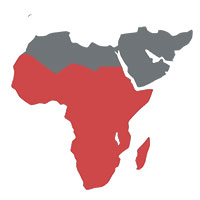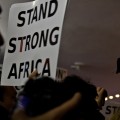Youth Carry the Burdens and Solutions of Climate Change
admin | December 6, 2011.
Youth across Africa, through non-formal education programs, are being educated on the burdens and also opportunities of climate change.
 Every day when Beatrice Omweri returns from work tired she walks a considerable distance to fill up to eight containers with water for her and her family. “I rarely get any sleep, and some nights are extremely cold.” The water, which her middle class Kenyan family simply can’t live without, is not clean and very bad for their health.
Every day when Beatrice Omweri returns from work tired she walks a considerable distance to fill up to eight containers with water for her and her family. “I rarely get any sleep, and some nights are extremely cold.” The water, which her middle class Kenyan family simply can’t live without, is not clean and very bad for their health.
A bad drought has recently hit Kenya, costing the lives of several people. “It broke my heart to see men leaving their women and children behind in a time of need, instead of owning up to the role of breadwinner,” Omweri said. Omweri now eats only twice a day and she and her sister have to be satisfied with getting smaller portions of food than her brothers. “Climate change has affected how I eat and drink and my role as a young woman,” she said.
To ensure girls’ voices are heard, she is representing the World Association of Girl Guides and Scouts’ 10 million members at the UN climate talks (COP17) in Durban. “I have to come to COP17 to be part of the solutions. I can’t imagine going back to Kenya without COP having produced a good outcome,” she said with a breaking voice. “We are not just victims, we are agents of change.”
Alphonse Karenzi grew up as the son of a small-scale farmer in rural Rwanda. From a young age he has been concerned with local community issues such as lack of access to electricity, water shortages and poverty. “Hunger in our community was caused by soil erosion and delayed rainfall,” he said.
In 2009 Karenzi was the only one in his village to receive a scholarship to study at university. Because he had seen the effects of environmental changes on his community, he decided to pursue a degree in environmental studies, which his peers – like many people in Africa – thought to be the study of tree planting. “When I ask my friends about climate change they say that perhaps God is hungry.”
He was so moved by what he was learning that he founded Sustaining Rwanda Youth Organisation (SRYO). SRYO is building improved cookstoves across Rwanda and teaching communities how to use them. “The cookstoves, of which 39 have been installed, reduces 85% of the firewood needed to cook food.”
Last year, Karenzi was asked by the Power On/Off project to share best practices with students in Europe. “All you need is people who are committed to making a change,” he said. He has just been awarded second place in Connect4Climate’s Energy competition for 18-24 year olds.
Throughout COP17 African youth have been actively illustrating how climate change directly affects their lives.
Similarly, a group of South African children gathered with the help of UNICEF to voice their concerns about climate change.
“When I was younger we used to see animals herding along streams from which they could drink clean water. Now, I see dry deserts. It’s painful, I wanted to share that with my children,” said Mokgali Seemolo from Limpopo Province.
“We want government to say ‘these children have young minds, but great ideas’. Decisions you make on a daily basis make me who I am,” he added.
“People are losing their lives in the name of development,” said Stuart Mbanyele from Mpumalanga Province. “Officials should dedicate one week of their time to go to rural communities to educate people and to see what’s really going on there.”

Boineelo Molokoane from the North West Province wants funding for solar panels and food gardens in schools. She believes that climate change needs to be taught. “Climate change should not only be studied by science students, but should be a compulsory subject for all kids.”
According to Stephanie Hodge, education specialist at UNICEF, education today needs to be relevant and empower students. “Children are at the centre of schools, cities, communities and the debate around climate change. Educating children is for the benefit of our environment and sustainable development.”
The participating scholars came to learn about climate change in different ways.
“I heard something about global warming on television in 2008, I Googled it and started educating my family and friends. It’s not invisible, I told them we are all part of climate change,” Molokoane said.
Mbanyele learned about climate change through school, together with UNICEF and government programmes, because his school only provided climate education for science students.
“Most of my climate education comes from this conference [COP17], but I already know what’s to be done to stop the effects of climate change,” said Monyombo Nomphelo from Limpopo Province.
This article was written by Beatrice Yeung.












comment